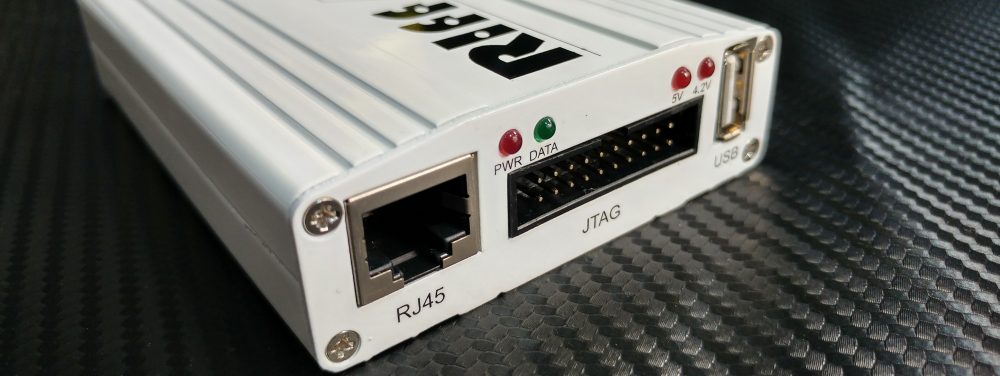05.10.2010 JTAG Manager v1.15, RIFF Box firmware v1.14 released
Whats new:
Firmware 1.14
———————
– code is optimized to avoid deadlocks in Cortex-A8 handling routines (deadlocks appear due to communication errors);
– Cortex-A8 debug is now available in ARM/Thumb modes (use the GDBServer for this);
– ARM946E core support is added (which is mostly a debug access to the CP15 coprocessor);
– added new RESET type for ARM9xxx cores: HW_RESET – targets which have dedicated TRST can be halted
at the very first instruction core executes after the system reset signal (NRST) was applied.
Importance of this: if some harmfull/”unlucky” code is written to a boot zone of a device, which (code)
on the device startup results in h/w blocking, jtag disabling, core resetting, etc., then connecting via JTAG to such target
becomes an impossible task, since JTAG host has not enough time to halt the target before it becomes unusable by a harmfull code.
Using HW_RESET type ensures the target’s core does not execute even a single instruction after the reset signal (NRST) was applied.
– removed bug which could cause deadlocks of box during a h/w script execution.
____________
JTAG Manager 1.15
———————
– added extended flash chip info handling for example for NOR memories support by DCC Loaders;
– added Resume feature for interrupted writes (which could be performed by WriteMemory button (DCC Page) or by Resurrector DLL):
if target loses power, connection is broken or any other malfuntion happens during write operation, software will store current
write context; you can reconnect target and start write/resurrection again – software will prompt you whether to start again or to continue write from the
interrupted point. This feature is applicable to all write conditions (writes by resurrectors, or manual writes through the DCC Read/Write page features).
– added 3 buttons on Box Service page for quick access to the RIFF’s manual PDFs;
– fixed a not harmfull bug inside of the core reset (when NRST is applied) command sequence;
– added feature: if write error appears and ‘Ignore’ is choosen, user can order software to apply ‘Ignore’ for further write errors automatically;
– added standalone setup dialog for automatic write errors handling;
– added BAD Blocks Handling feature using the following algo:
If there are data chunks A B C & D to be written into blocks 1 2 3 & 4 respectively, and for example block 3 is found to be BAD, then software will write:
data A -> into block 1
data B -> into block 2
——–> block 3 is bypassed (and marked as bad)
data C -> into block 4
data D -> into block 5
It’s clear that block 5 was not intended to accept the data D. Thus:
– if block 5 had some other info then this info will be lost and will be overwritten with the data D.
– if block 5 was free for use, then nothing bad happens.
So, main conclusions:
———————
1. BAD Blocks Handling is IMPOSSIBLE (POINTLESS) for writting FULL images (user can chose only ‘Ignore’ option)
2. When writting data chunks of length less than full flash size user is prompted to select 2 options:
a) Overlap (in example above this would mean to write data D into block 5)
b) Cut Excess (in example above this would mean to not touch original 5th block’s contents and just discard data D to be written)
************************************************** ************************************************** *********************************
NOTE: Bad block handling is allowed by default only through the DCC Read/Write page write.
—– Old Resurrector DLLs were not adapted for this feature, thus Bad Block handling will be implemented only in new DLLs.
If you meet a Bad Block Error during resurrection contact support in order to update DLL to a Bad Blocks adapted version.
************************************************** ************************************************** *********************************
– solved problem which caused update module to display files for download which were already up-to-date for cases
when JTAG Manager was installed on FAT (FAT/FAT32) file systems.
– very dangerous bug fixed: “Irnored” word misspelling is corrected to the valid “Ignored” one
